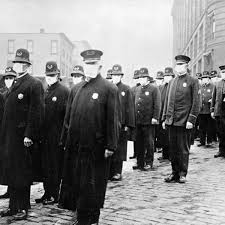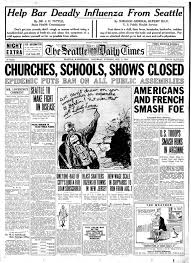
While many of us may think lockdown and mask-wearing is an entirely new phenomenon, as is often the case, history begs to differ.
The Corona Virus or COVID-19 as it is also known had a predecessor in 1918. H1N1 was an avian derived virus that eventually became known as Spanish Flu although it had not originated in Spain. It was vicious, deadly, and reminiscent of the Black Death of 1348 and the Great Plague of 1665
Censorship during World War One (WWI) dictated that the global spread of the flu should not be publicised because it would affect morale, lowering spirits, and optimism. Spain was a neutral country during WWI and was not obliged to censor the information. When King Alphonso XIII of Spain contracted the disease along with many other Spaniards, it was widely reported in the Spanish newspapers, hence the Spanish Flu, or sometimes Spanish Lady.
H1N1 spread throughout the world during the Spring of 1918 as the war raged in what was to be its final year. The Great War was a war allegedly to end all wars and which resulted in the death of thirty-eight million people.
In the Autumn of 1918, a second wave of the virus occurred followed by a third. The British government did not want to introduce quarantine restrictions in public places. They thought that it would damage morale whilst the country was at war, but wearing a mask became mandatory.
Most victims of H1N1 were young, healthy, and fit. The virus was set to cause more deaths than the war. It was one of the deadliest naturally occurring events in history and was abetted by the movement of troops and by people gathering to aid the war effort and celebrate the end of the war. H1N1 killed approximately one hundred million people throughout the world. These numbers are mind-blowing, and I find it particularly worrying that there was a second and third wave of the H1N1 virus. As I write this, the government is in the process of relaxing, reversing, and altering some of the restrictions which they put in place to keep us safe, easing us back to normality. I hope that we as a nation use our common sense and adhere to the processes which remain. I wonder what future generations will make of the part we are playing in the history of global pandemics.
H1N1 was aggressive and fast-acting. Characteristically victims had breathing difficulties, feverish temperature, and haemorrhaging
“Victims collapsed in the streets, haemorrhaging from the lungs and nose. Their lungs filled with pus causing them to gasp for breath. They quickly became cyanotic, turning a deep blue. The lucky ones died quickly, but others had projectile vomiting and explosive diarrhoea. Survivors were often left with heart problems, lethargy, depression, and nervous disorders”
(Catherine Arnold, Pandemic 1918)
Pandemic 1918 is an excellent book if you fancy more in-depth information which is so poignant and current.
‘CO’ stands for corona, ‘VI’ stands for virus and the ‘D’ stands for disease. At the time of writing, there have been 45,554 deaths in the UK. By law, we must wear a face mask/covering in shops or public transport. COVID-19, just like H1N1, is spread between people via microscopic respiratory droplets. Coughing, sneezing, hand contact, even contact with surfaces. Social distancing has become second nature for most of us, keeping two meters, and now, 1 meter apart from others. No physical contact. For most of us, this way of life was strange at first, with no handshakes, no hugging, etc, but for some people with learning disabilities, sight impairment, and dementia, for example, physical distancing has made daily living extremely difficult indeed, if not impossible.
COVID-19 can cause more severe symptoms in the elderly and people with pre-existing conditions such as asthma, hypertension (high blood pressure), heart disease, lung disease, and diabetes, so individuals who fall into these categories have been urged to take extra care.
We have been asked to ‘Stay Safe’ and to stay at home. Rainbows appeared overnight as symbols of hope, and are displayed in houses and shops throughout the country, many painted or drawn by children who for the most part have been accepting of the imposed changes. The children who live near me looked forward to the weekly ‘Clap for carers’ initially aimed primarily at healthcare workers and our emergency services working for the National Health Service. Every Thursday at 8 pm we would gather by our front doors and clap, bang pots and pans with wooden spoons, and play music, to show our appreciation and gratitude for all the people working hard to keep us safe and living as normally as possible in this strange new world.
On the 2nd of April, this weekly appreciation ritual was extended to every key worker, postal workers, cleaners, engineers, vets, delivery drivers, shop workers, teachers, waste collectors, armed services, and all manufacturers. So many deserving people, we cannot thank you enough.
So much has been written about living in lockdown since March 2020, so I thought carefully before adding my tuppence worth.
For me, there has been no heartache or drama. My daily life has been uneventful. Since the lockdown began, I have not done much of anything. In the beginning, I thought that lockdown would provide an opportunity to crack on with my new book, writing it that is, but alas, it has not worked out that way. Clearly, for me, a worldwide pandemic is not conducive to creativity. I am also very aware that personally, the evolution of life in lockdown has been an easy one.
I have not lost a loved one to COVID-19. I do not know anyone who has succumbed to it. I am a retired health professional; therefore, I am not subjected to emotional trauma and risk daily. (That said, I will return to nursing if I am required to do so.) I am not employed in a service or industry now facing the threat of closure and redundancies. I am not living in a high rise, I have a garden, nor am I working full time from home while trying to home school my children. In truth, I am a closet introvert at heart and liked the idea that I could stay at home every day with no excuses required.
Every day I am thankful that my mother, who had Alzheimer’s, died peacefully before the outbreak. We were able to visit her, comfort her, and have a traditional funeral service surrounded by family and friends. I cannot bear to think about how she or my dad would have coped with lockdown as thousands of people have had to do, in a care home with no visitors, no hugs, no little gifts, and no respite for the staff.
My heart goes out to everyone affected by this unpredictable, indiscriminate, and deadly virus. Believe me, I know how fortunate I am. I am truly thankful.
In the beginning, every day increased numbers of deaths due to COVID-19 were reported.
Every day the UK and Scottish governments update the nation about the rapid changes taking place and what measures have been planned or taken to monitor and control the situation. When Prime Minister Boris Johnson contracted the disease, it seemed to bring a sense of stark realism for many people, in that if the PM could end up in hospital anyone could. Health bulletins began being broadcast telling us to stay at home, wash our hands, and use alcohol gel, and sanitisers. We were told to use disposable tissues when we coughed or sneezed. We were told to self-isolate if we had a temperature, a new persistent cough, and/or shortness of breath. Eventually, a loss of taste/smell was added to the list. We have been reminded repeatedly that in more severe cases the infection can cause pneumonia, severe acute respiratory syndrome, and death, but still, some individuals feel that they are above the law as well as above the law of nature, gathering and meeting up in public places and private homes with no regard to their own or other people’s safety.
Some of us have been complaining about our lot, about the need to stay at home, wear a mask, socially distance, no public gatherings, the list goes on but compared to those people, our ancestors, who lived through the 1918 pandemic we have it easy. We have electricity for a start, hot and cold running water, and indoor toilets, which most people did not in 1918. We have not been facing a massive loss of life, fighting a world war for the last four years with loved ones who volunteered or were conscripted to fight for King and country overseas in unimaginable conditions. We do not have rationing as they had. Yes, panic buying caused some shortages in the early days when COVID- 19 raised its ugly head, but things soon settled down.
We have televisions, radios, computers, Wi-Fi, social media, Skype, Zoom, etc We can talk face to face with loved ones who live a distance away. We can sing in a choir, join online classes, and have groceries and food delivered. Of course, there are exceptions, but as a rule, most people have access to some or all of the above.
As I sit here writing, I have heard on the radio that PM Boris Johnson has warned of “tough times ahead” as coronavirus will haunt the UK until the middle of next year, this comes one week after he seemed to promise “normality by Christmas” (The Independent.)
Another individual has scoffed at this notion, saying we are not in control of the virus and that we will not be back to normal next year at all.
The R rate, (reproduction number = the average number of secondary infections by a single infected person) has not altered much with the re-opening of pubs and restaurants…yet? The fact remains that the poorest areas have suffered more than twice as many deaths as the richest. The police ‘simply don’t have the capacity to enforce face masks and are urging people not to have a go at those who do not wear them. Two places in England are facing local lockdown… and so it goes on. Positive vibes, negative vibes, and contradictory vibes.
To end my tuppence worth, I must say I have noticed more camaraderie and community spirit. There is a general sense that we are all in this together and must support each other.
Wildlife is blooming and thriving, the sky even looks bluer, and the air is fresher. Many of the world's lakes and rivers have rebounded, we have seen images of the canals in Venice looking clean and clear for the first time in years. Levels of pollution have fallen. Many people will holiday in the UK this year instead of flying off to foreign climes, boosting local economies.
Of course, 45,554 deaths, with 297, 146 cases are a titanic price to pay for the unseen benefit lockdown had brought about. Tragically so, but I hope that we will learn and grow, change for the better, progress, and develop in a positive way which may have been unthinkable before lockdown, and I have a rainbow in my window to prove it.
Jacqueline Heron Wray. July 2020
#coronavirus, #COVID-19, #masks,#spanishflu, #1918,





Comentarios